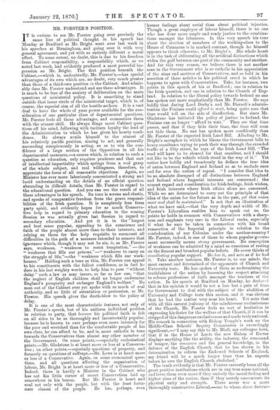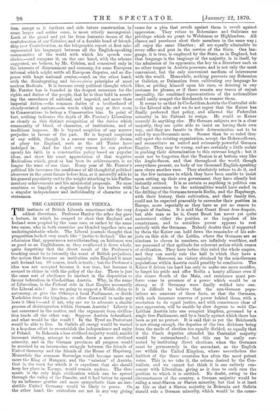MR. FORSTER'S POSITION.
IT is curious to see Mr. Forster going over precisely the same line of political thought in his speech last Monday at Bradford as Mr. Bright went over last week in his speeches at Birmingham, and going over it with very
general agreement, and yet with so entirely different a moral effect. To some extent, no doubt, this is due to his freedom from Cabinet responsibility, a responsibility which, as we noted last week, had evidently produced a most powerful im- pression on Mr. Bright. The first position beneath the Cabinet,—which is, undoubtedly, Mr. Forster's,—has special -advantages of its own which are, no doubt, very much greater
than those of a third-rate position in the Cabinet. And admir- ably does Mr. Forster understand and use these advantages. It
is much to be free of the anxiety of deliberation on the main questions of ministerial policy. It is something to stand outside that inner circle of the ministerial target, which is, of .course, the especial aim of all the hostile archers. It is a vast deal to have the whole of your power available for the con- sideration of one particular class of departmental questions.
Mr. Forster feels all these advantages, and economizes them with the utmost skill. He always flings moot Cabinet ques- tions off his mind, following with taciturn loyalty the lead of the Administration to which he has given his hearty confi- dence. He always avails himself to the utmost of his relatively pacific position, aiming to act, and generally -succeeding conspicuously in acting, so as to win the con- fidence of a large section of the Opposition in all his departmental measures,—a course which, in relation to such a .question as education, only requires prudence and that sort -of intellectual impartiality which springs from a real grasp of the whole subject, and real willingness, therefore, to -.appreciate the force of all reasonable objections. Again, no Minister has ever more laboriously concentrated a strong and lucid understanding on the details of an official question abounding in difficult details, than Mr. Forster in regard to the educational question. And you can see the result of all these advantages in his speech. Its tone is serene and elastic, .and speaks of comparative freedom from the grave responsi- bilities of the Irish question. It is completely free from party spirit, and evidently hopes for as much Conserva- tive help in regard to primary education in the coming Session as was actually given last Session in regard to secondary education. And yet it is in the • largest and best sense popular, appealing to the conscience and faith of the people almost more than to their interests, and -relying on them for the help requisite to surmount all difficulties in the path of a measure intended to remove that
ignorance which, though it may not be sin, is, as Mr. Forster says, weakness, " weakness to resist temptation," — the
" weakness that fills our prisons,"—" weakness to carry on -the struggle of life,"—the " weakness which fills our work- houses." Holding such a tone as this, Mr. Forster can appeal to his constituents with the fullest confidence, as in fact he does in his last weighty words, to help him to pass "without delay" such a law as may insure, so far as law can, "that 'the neglect of English children shall no longer undermine England's prosperity and endanger England's welfare." No snan out of the Cabinet ever yet spoke with so much of real .authority, and so little of ostentation or pretension, as Mr. Forster. His speech gives the death-blow to the policy of delay.
It is one of the most characteristic features, not only of Mr. Forster's speech, but of his uniform individual position
in relation to party, that because his political faith is felt
on all sides to be so thoroughly and incontestably popular, because he is known to care perhaps even more intensely for the poor and wretched than for the comfortable people of his own class, he can afford to be, and is, more catholic in tone towards the Conservatives than almost any other member of the Government. On some points,—especially ecclesiastical points,—Mr. Gladstone is at heart more or less of a Conserva- tive ; on other points,—especially questions of property, and formerly on questions of suffrage,—Mr. Lowe is at heart more -or less of a Conservative. Again, on some economical ques- tions, and all questions affecting the organization of labour, Mr. Bright is at heart more or less of a Conservative. Indeed, there is hardly a Minister in the Cabinet who has not his little corner of secret Conservatism laid up -somewhere in his bosom. But Mr. Forster is heart and soul not only with the people, but with the least fortu-
nate classes of the people. He has, perhaps, even
keener feelings about social than about political injustice. Though a great employer of labour himself, there is no one who has done more ample and ready justice to the combina- tions amongst the labourers. In this very speech his tone about the election of members of the working-class to the House of Commons is in marked contrast, though he himself appears to think otherwise, to Mr. Bright's. His whole heart is in the task of obliterating all the artificial distinctions which widen the gulf between one part of the community and another. And for this very reason, we believe, there is not another man in the Government who is so catholic in his appreciation of the aims and motives of Conservatives, and so bold in his
assertion of those articles in his political creed in which he
happens to agree with Conservatives. Take, for instance, two points in this speech of his at Bradford ; one in relation to the Irish question, and one in relation to the Church of Eng- land. In relation to the liberal policy towards Ireland no one has spoken out more emphatically than Mr. Forster. He says boldly that during Lord Derby's and Mr. Disraeli's adminis-
tration the Fenians could afford to wait, being quite sure that time would tell on the side of disaffection. But since Mr.
Gladstone has initiated the policy of justice to Ireland, the Fenians can no longer " afford to wait." They see that time passes, and that if they bide their time, the time will soon not bide them. No one has spoken more confidently than Mr. Forster of the expected Irish Land Bill. Alluding to Mr. Bright's metaphor in which he likens the Government bills to heavy omnibuses trying to push their way through the crowded
traffic of a City street, he says of the Irish Land Bill, " The road will have to be cleared for that omnibus, and I should
not like to be the vehicle which stood in the way of it." Yet
notice how boldly and tenaciously he defines the true idea of union between England and Ireland so as to exclude once
and for ever the notion of repeal. " I consider that idea to
be an absolute disregard of all distinctions between England and Ireland where Imperial interests are concerned ; the
utmost regard and consideration for Irish feelings, Irish wishes, and Irish interests where Irish affairs alone are concerned. While we are determined to carry out the principle of that
idea of the union for the future as in the past, yet that union must and shall be maintained." Is not that an illustration of what we have said,—that the very depth and width of Mr.
Forster's Liberalism enables him to speak out on the points he holds in common with Conservatives with a sharp- ness and emphasis very rare in the Liberal ranks, especially if what he says be taken in connection with his broad reassertion of the Imperial principle in relation to the confederation of our Colonies under the mother-country I Mr. Forster, indeed, is one of those to whom popular govern-
ment necessarily means strong government. No conception of weakness can be admitted by a mind so conscious of resting
on the firmest and broadest popular beliefs. He never thinks of
conciliating popular support. He has it, and acts as if he had it. Take another instance, Mr. Forster is, to our minds, the
most earnest and determined of the opponents of Church and University tests. He has spoken of them as undermining the truthfulness of the nation by loosening the respect attaching to solemn professions of faith amongst the teachers of the nation. In his speech at Bradford on Monday, he declared that in his opinion it would be not a loss but a gain of time for Government to deal with the subject of the abolition of University and College tests this session, and it was obvious that he had the matter very near his heart. Yet note that with all this earnest jealousy of the mischievous exclusiveness of the Church, Mr. Forster feels no sort of hesitation in expressing his desire for the welfare of that Church, if it can he stripped of this dangerous exclusiveness and made truly national. His remark in connection with Bishop Temple's work on the Middle-Class Schools' Inquiry Commission is exceedingly significant,—"I may say this to Mr. Miall, my colleague here, that if in the House of Lords the new Bishop of Exeter displays anything like the ability, the industry, the command of temper, the resources and the general knowledge, in the defence of the English Church that he has shown in his determination to reform the Endowed Schools of England, my friend will be a much longer time than he expects before he sees the English Church abolished."
The truth evidently is that Mr. Forster earnestly loves all the great positive institutions which are in any true sense national, and loves them even more if they embody the moral feeling and higher aims of the nation, than if they merely concentrate its physical unity and strength. There never was a more thoroughly constructive Liberal,—one to whom sheer destruc-



































 Previous page
Previous page